Your Best Motorcycle Chain Lubes
Lube it or lose it
Right, the MO staff has spent the last nine months exhaustively testing every chain lube on the market in all possible climatic conditions, over thousands of miles, to bring you this, the most authoritative work on motorcycle chain lubes ever assembled. Just kidding.
What kind of chain lube to use is right up there with what kind of oil. Earlier we learned that WD-40 is probably not the way to go, but you know we’ll get mail even about that. We also learned at the same time, that even though they’re sealed, O- and X-ring chains do still require lubrication to keep those seals pliable, so that they keep the internal lubrication inside and dirt and debris out. It’s all about the seals. Just make sure whatever you use says O-ring compatible. We can’t really tell you which lube is best, but we can tell you which lubricants lots of people swear by. In the end, it probably doesn’t matter which lube you use as long as you use lube.
(PS: We’re talking modern sealed chains, not the non O-ring type that people used to put on TZ250s and maybe still do on Moto3 motorcycles to “free up” horsepower.)
Table of Contents
1. ProHonda Chain Lube & Cleaner
Our pal Rick Mitchell doesn’t work at Honda anymore but he can’t keep himself from pimping this lube, and for good reason. Mike “Chico” Montes, spent months developing this product, says Rick, with the mandate of having the highest performing chain lube (at that time) on the market! The no-fling formula keeps it in place, and as for the rest of the claims, in Honda a lot of people trust. Also, it makes sense to clean whatever you’re about to lube with a product designed not to harm those seals.
Bottom Line
- Cleaned and lubed is how Soichiro would've wanted it
2. Maxima Chain Wax
This stuff is really popular too, among people who’re afraid that grit sticks to sticky chain lube. “Unlike lube,” says Maxima, “Maxima Chain Wax is designed to cling to the chain, providing all the lubrication and protection required, without the messy fling.” The chain lube makers, of course, say the same thing. Here, your Parafilm formula sprays on as a liquid, penetrates and becomes a soft waxy film lubricant that’s said to provide outstanding rust and corrosion protection.
Bottom Line
- Non-greasy formula
3. Bel-Ray Super Clean Chain Lube
Lots of good reviews for this stuff, too, which some users describe as kind of a cross between regular lube and wax. It’s said to use “emerging lubricant technology” for unsurpassed wear protection for long chain and sprocket life by forming an outer protective coating that will not attract dirt, sand, or grit and will not fling when used as directed.
Bottom Line
- Leaves a nice protective coating
4. Motorex Road Chain Lube
Nothing subpar comes from Switzerland, does it? Sprays on white so you can see it, and contains a special wear-reducing lubricant with excellent adhesion for all motorcycle chains especially X-ring and O-ring. Note that like lots of manufacturers, Motorex offers road and off-road formulas – and now there’s an Adventure version, to “ensure lubricity from the muddiest low-speed bogs to the longest transcontinental highway slogs.”
Bottom Line
- High-end and Swiss!
5. Motul C2 Chain Lube Road
Informal Facebook polling found much love for Motul, though its online reviewers are a bit less glowing, with some users contending its anti-fling properties are greatly exaggerated compared to some other lubes. But hey, Motul is a big MotoGP sponsor, so wth?
Bottom Line
- Support MotoGP and France
6. DuPont Teflon Chain-Saver Dry Self-Cleaning Lubricant
This stuff replaces Dupont’s original Teflon Multi-use Dry Wax Lubricant that was my go-to chain salve for years. And while I haven’t tried the new Chain-Saver WBCLFCDVWTF formula, all the five-star reviews make it sound like a real winner. She goes on wet to penetrate and coat surfaces with a dry Teflon fluoropolymer wax film, which is claimed to not absorb abrasive contaminants including dirt, grit, paper dust, mill powders, lint and grass. Best of all, the price is right.
Bottom Line
- with Teflon
7. PJ1 Blue Label Chain Lube
Last but possibly not least, who knows?, PJ1 Blue Label has its adherents too, most of who love it for its adherence and lack of color. PJ says it protects against rust and corrosion, displaces and repels water, extends O-ring life, protects sprocket surfaces, won’t fly off, and provides minimal rolling resistance.
Bottom Line
- A popular choice, great reviews
FAQ
What types of motorcycle chain lubes are there?
The two basic types are chain lube and chain wax. Both claim to penetrate and stick to your chain like glue for maximum protection, but the general trend seems to be that waxes offer the best protection while also producing less sticky residue to fling onto your wheels and chain guard than petroleum-based lubes. Fling, though, is a subject that’s prone to operator error; if you use too much of any lube, some of it’s going to fly off. Some think chain lube, properly and sparingly applied, lasts longer than wax. If you’re a meticulous chain maintainer, you might like wax. If you tend to forget your chain for a few thousand miles, you might be better off with traditional lube. Feel free to experiment.
How do I choose a motorcycle chain lube?
Read the reviews. Check into your motorcycle’s forum, and ask what the experienced members there like best. It’s kind of like oil; there may not be a “best,” but the idea that you’re aware it’s there and needs to be maintained occasionally is the important thing. In the old days, we asked the grizzled veteran behind the parts counter. That’s still a great option if you still have a parts counter with a GV.
How often do I need to lube my chain?
That’s another controversy. Some riders can’t sleep if they don’t lube their chain every few hundred miles. Others neglect their chains much longer. Modern O- and X-ring chains come with a lifetime supply of lubricant for their rollers stored behind those rubber rings, so any chain lube’s main chore is to keep those seals soft and pliable. A little external rust doesn’t affect the chain’s function at all, but some people are more willing to display that “patina” than others. Checking and lubing the chain at least every six months is a good idea, depending on your riding environment. Arid-climate street bikes can probably go farther, but lubing your chain is a good time to check other things while you’re at it, like chain tension, wheel bearings, brake pads…
Recently updated:
August, 2022: Motorex lube updated
Additional Resources
All About Chains: A Conversation with A Chain Legend
How to Clean Your Chain: A Necessary Evil
Ask MO Anything: How Often Do I Have To Lube My Chain?
We are committed to finding, researching, and recommending the best products. We earn commissions from purchases you make using the retail links in our product reviews and other articles. Learn more about how this works.
Become a Motorcycle.com insider. Get the latest motorcycle news first by subscribing to our newsletter here.
More by John Burns



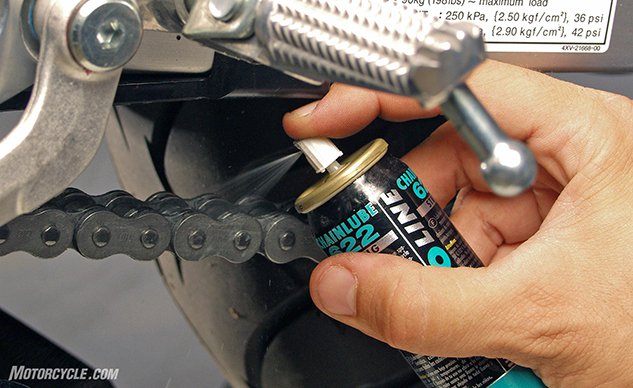
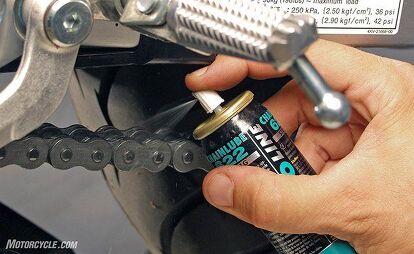


















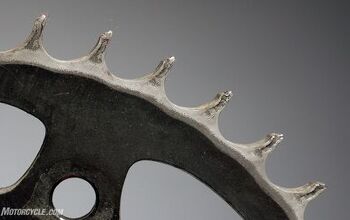

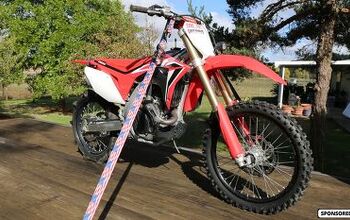



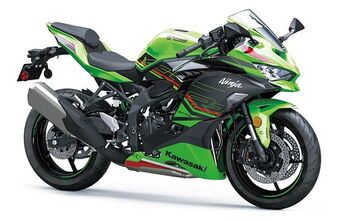




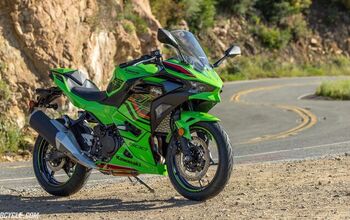



Comments
Join the conversation
Using Maxima Chain Wax on my Vulcan S. 600 mile intervals as recommended by the manufacturer. A Pit Bull forward stand makes it a lot easier. I could probably get away with longer intervals but it stays under a cover and I don't have a garage.
I prefer to apply chain lube after a ride, while the chain is warm. It seems to penetrate better and as the chain cools, the lube drys and stays on better during the next ride.